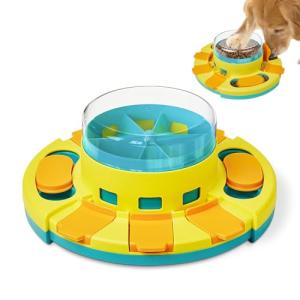We’ve all marveled at our dogs’ ability to understand a command, solve a puzzle, or even seem to anticipate our moods. But just how smart is your dog? Canine intelligence is a fascinating and multifaceted field, encompassing everything from problem-solving skills to emotional understanding. While the concept of "smarts" in dogs isn't always straightforward, scientists and dog enthusiasts alike have developed ways to measure and compare the incredible cognitive abilities of our furry companions.
Defining Dog Intelligence: More Than Just "Good Boys" and "Smart Girls"
When we talk about dog intelligence, it’s not a single, monolithic trait. Instead, it’s often broken down into several categories:
- Instinctive Intelligence: This refers to the innate abilities a dog was bred for – herding, hunting, guarding, retrieving, etc. A Border Collie's ability to herd sheep, for example, is a testament to its highly developed instinctive intelligence.
- Adaptive Intelligence: This is a dog's ability to learn from its environment and solve problems on its own. It's about how quickly they figure things out, adapt to new situations, and learn from experience.
- Working & Obedience Intelligence: This is the "school smarts" of dogs – their ability to learn from humans and follow commands. This is often what people think of first when discussing dog intelligence, and it's heavily influenced by training and consistency.
The Canine "IQ Test": How Do We Measure Smartness?
While you won't find a standardized canine IQ test in the same way you would for humans, researchers and animal behaviorists use various methods to assess dog intelligence:
- Problem-Solving Tasks: These often involve puzzles that require the dog to manipulate objects, find hidden treats, or navigate obstacles. For example, a common test might involve placing a treat under a cup and seeing if the dog can figure out how to knock over the cup to get the reward.
- Memory Tests: Researchers might observe how long a dog remembers a command or the location of a hidden object.
- Social Cognition: This assesses a dog's ability to understand human gestures, cues, and emotions. For instance, can the dog follow a pointing finger to a hidden treat?
- Trainability Assessments: How quickly does a dog pick up new commands? How consistently do they perform them? This is a strong indicator of working and obedience intelligence.
- Novelty Response: How a dog reacts to new objects or situations can reveal its cognitive flexibility and ability to adapt.
Breed Comparisons: Are Some Dogs Naturally Smarter?
While individual variation within breeds is significant, extensive research, notably by Stanley Coren, author of "The Intelligence of Dogs," suggests there are general trends in working and obedience intelligence across different breeds. Coren's rankings are based on the results of obedience trials and surveys of dog obedience judges.
Here's a glimpse at some of the breeds often cited for their exceptional working and obedience intelligence, along with some that may require a bit more patience:
Top Tier (Highly Intelligent & Eager to Please):
- Border Collie: Often considered the Einstein of the dog world, Border Collies excel in herding and competitive dog sports due to their incredible focus, trainability, and problem-solving abilities.
- Poodle: Don't let their fancy haircuts fool you! Poodles are highly intelligent and excel in obedience, agility, and even hunting. They are quick learners and eager to please.
- German Shepherd Dog: Known for their versatility, German Shepherds are intelligent, trainable, and excel in police work, military roles, and as service dogs.
- Golden Retriever: Friendly and intelligent, Golden Retrievers are highly trainable and make excellent family pets and assistance dogs.
- Doberman Pinscher: Alert, intelligent, and fiercely loyal, Dobermans are quick learners and excel in protection and obedience work.
Middle Tier (Above Average Intelligence):
This group includes a wide range of breeds that are still very capable learners but may require a bit more repetition or different training approaches.
Examples include Siberian Huskies, Basset Hounds, and some terriers.
Lower Tier (May Require More Repetition or Different Motivation):
These breeds may be incredibly smart in other ways (e.g., strong instinctive intelligence), but their working and obedience intelligence might be less prominent. They might be more independent or less driven by pleasing humans in a traditional training sense.
Examples often include breeds like the Afghan Hound, Basenji, and Bulldog.
It's crucial to remember that these are generalizations. A "less intelligent" breed can still be a wonderful companion and a quick learner with the right training methods and motivation.
Beyond Breed: What Else Influences Your Dog's Smartness?
While genetics play a role, many other factors contribute to a dog's overall intelligence:
- Early Socialization and Stimulation: Pups exposed to a variety of sights, sounds, and experiences early in life tend to be more adaptable and confident.
- Training and Enrichment: Consistent, positive reinforcement training not only teaches commands but also stimulates a dog's mind. Puzzle toys, interactive games, and new experiences keep their brains engaged.
- Nutrition and Health: A healthy diet and proper veterinary care are essential for optimal brain function.
- Relationship with Owner: A strong bond and clear communication between dog and owner can significantly enhance a dog's learning potential. Dogs who feel secure and understood are often more willing to engage in learning.
Unlocking Your Dog's Potential
Regardless of breed or perceived "intelligence," every dog has the capacity to learn and grow. Here are ways you can help enhance your dog's cognitive abilities:
- Consistent Training: Short, fun, and positive training sessions are key. Focus on basic obedience but also consider teaching tricks or more complex tasks.
- Puzzle Toys and Interactive Games: These provide mental stimulation and encourage problem-solving.
- Nose Work: Scent games are incredibly enriching for dogs and tap into their powerful sense of smell.
- New Experiences: Introduce your dog to new places, people, and objects. Safely exploring the world helps build confidence and adaptability.
- Agility or Dog Sports: These activities combine physical exercise with mental challenges, perfect for intelligent and energetic breeds.
Ultimately, your dog's intelligence is a unique blend of instinct, adaptability, and learned behaviors. By understanding the different facets of canine intelligence and actively engaging with your dog, you can help them reach their full potential, fostering a deeper bond and a truly brilliant companion. So, how smart is your dog? Likely even smarter than you think!







